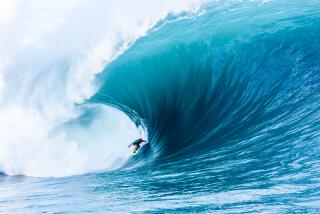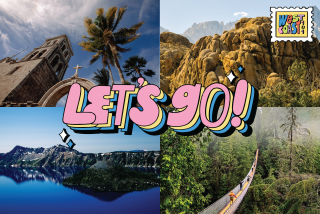Hosting America’s Cup : Aussie City Riding High on the Wave
FREMANTLE, Australia — The lights burned bright that September night in 1983. Halfway around the world, an Australian yacht won the America’s Cup off Newport, R.I.
Those few Aussies who had not stayed up to watch the race on live TV probably now believe that they did. It was a victory of that magnitude.
Here in Fremantle, down the Swan River from Perth, home of Alan Bond’s winning boat, the celebration was tumultuous. The America’s Cup would be leaving U.S. shores for the first time in 132 years.
“Those New York blokes could have bitten their fingers off at the elbow,” crowed John Cutting, the crusty director of Fremantle’s chamber of commerce, recently.
Now, in the offshore waters of the Indian Ocean, New Yorkers, Californians, Frenchmen, Italians, Britons, New Zealanders and Canadians are racing for the right to try to take the cup away.
‘Will Never Be the Same’
“And this place,” Cutting declared proudly but a bit wistfully, “will never be the same again.”
Hard-nosed little Fremantle--gold-rush port, World War II submarine base and shipper of Western Australia’s wheat and wool--is struggling manfully with hosting a millionaires’ regatta.
“To say the impact has been dramatic is an understatement,” observed Mayor John Cattalini, seated in his office at Fremantle’s recently restored Town Hall. Outside, the last few bricks were being fitted into the walkways of the newly renovated Town Square.
Along South Terrace, T-shirts with Cup themes were selling briskly, and refurbished bars in repainted hotels were brimming with mugs of Swan Gold, Matilda Lager and the formidable Anchor Best Bitter.
Everything Going Up
Awnings were going up, along with rents, prices and tempers.
The Brothers Micalizzi, owners of the Primavera restaurant, complained to city officials that mobile vans selling souvenirs had blocked their patrons’ view of the waterfront.
“Apart from looking grotty,” Guido Micalizzi groused, one of the vans was operated by a man from Australia’s Eastern States.
Meanwhile, as the 23,000 citizens of blue-collar “Freo,” as they call their town, try to maintain an outwardly relaxed attitude about their responsibilities and financial possibilities as hosts to a major sporting event, outsiders were taking potshots.
“It’s a bit of a gloss-over, isn’t it?” a motel clerk in Albany, a port to the south, said of Fremantle’s new look. “No decent Australian would go down there to buy anything. It’s a rip-off.”
More celebrated was CBS reporter Morley Safer’s comment, on the U.S. television network’s “60 Minutes” show, that Fremantle had been “tarted up.” That produced a billboard and a T-shirt declaring that “An hour in Freo is better than 60 Minutes in the U.S.A.”
The problem in part is that Freo and the cup don’t seem to be natural partners, though the yachtsmen have no complaints about the racing facilities. Perth, a bustling big city of skyscrapers and millionaires, might have been a better match if it were on the ocean and the measure were prestige.
An American writer here for the races gave an example. A San Franciscan from his city’s tony St. Francis Yacht Club sailed up the Swan to the Royal Perth Yacht Club and asked for reciprocal moorage rights.
“My regrets,” he was reportedly told, “but we only have reciprocal arrangements with other ‘royals.’ ” An explanation that there are no “royals” in the United States proved fruitless.
Fremantle is no Newport and no Perth, but it makes no apologies. It’s a working port that has seen good times and bad. It’s cosmopolitan, with large Italian, Yugoslav and Greek communities.
And despite the paint, Freo’s always been a bit rough around the edges.
“I remember the days you’d have to dodge them coming head-first out of the bar of the Cleopatra,” Cutting of the Chamber of Commerce said with a grin.
A saleswoman in a gift shop also remembers. “A lady wouldn’t go into those places,” she said.
In the 19th Century, eastward-bound sailing ships came to Fremantle, and passenger liners called here into the 1960s. Last month, the British carrier Illustrious was berthed at Victoria Quay, and U.S. Navy ships come in for supplies and liberty from Indian Ocean patrols.
Freo waits with a good meal and good times.
“Ah, yes, the ladies of the demimonde,” Cutting drawled, doing a perfect though unintentional imitation of W.C. Fields. “We say when you go past Leighton (a street on the Fremantle limits on the road to Perth), you’ve left the finest city in Western Australia.”
Anyone who doesn’t like it here can head that way, he implied, then said: “These johnny-come-latelies complain about the smell of sheep. I say, ‘Stiffen up, mate. It’ll clear your sinuses.’ ”
But the Cleopatra, where they once passed through the bat-wing doors headfirst, has been renamed the Auld Mug--for the Cup--and elsewhere old Freo has a new look. Even the Western Australia penitentiary on the hill, built by immigrant convicts in the mid-1800s, looks freshly painted.
The patio bar of the Norfolk Hotel, reportedly a dump before Australia won the Cup, has become a hangout for visiting yachtsmen and their groupies. A McDonald’s has been built on Arthur Head, just yards from the spot where Capt. Charles Fremantle landed to claim the west for the British Crown.
Even the determinedly blase townspeople--”Freo will survive this, mate”--are talking about the Cup. Everybody, it seems, is a friend of Bond, the Australian yachtsman--”good old Bondy”--or has heard the latest complaint of the combative California skipper Dennis Connor, whose 12-meter yacht “Stars and Stripes” has been locally nicknamed “Stalls and Gripes.”
And everyone knows that the Gallic entry, “French Kiss,” has a support boat named “Kiss Me Tender” and a runabout called “Kiss Me Quick.”
The visiting yachtsmen, in turn, have come to know “the Doctor.” “Dr. Fremantle” is the name of the daily offshore breeze, 20 to 30 knots to fill the sails, and subject of a popular T-shirt: it shows a man hugging the mast of a sharply heeling yacht and demanding: “Who Called the Doctor?”
The commercial buildings in the harbor area, put up in the gold rush of the 1890s, give the town an architectural charm. Mediterranean immigrants provided the sidewalk cafes, a Freo fixture. The scene, and low rents, attracted artists who have added to the city’s character. Followers of the guru Bhagwan Shree Rajneesh stopped here before moving on to Oregon. Locals called them the Orange People, and remember their restaurant, “Zorba the Buddhist.”
Federal and state money has poured into the city in preparation for the races, or coincidentally with them (Perth’s long-planned new international airport opened in late October). Even more important, Mayor Cattalini said, is the increased private investment in a town whose economy had been sliding in recent years.
The public and private total is hard to measure, but estimates range from $25 million to $50 million. That might seem a major expenditure, but it’s relatively small potatoes compared to what is being spent by the yachtsmen. More than 15 boats are involved, each backed by a syndicate with a budget of at least $5 million.
New harbors and other marine facilities built for the yachtsmen and other visitors will remain. Public housing has been pushed through government pipelines to accommodate families and singles squeezed out of modest quarters by rising rents or conversion to commercial space.
“Fremantle has a long history of social concern; it’s built into the system,” said Community Services director Kenneth Posney, a transplanted Detroiter.
The private sector, meanwhile, looks on the prospect of 200,000 visitors a day during February’s finals with dollar-signs dancing before their eyes. A rental syndicate is listing furnished homes for as much as $80 per person per day. The owners will vacate the place to live with friends or relatives, a real estate agent said.
So far, however, the crowds have not come. “It’s those Eastern Staters,” the real estate man sniffed. “They always book late.”
Restaurant operators and cab drivers say their out-of-town business has consisted largely of journalists and racing syndicate members. Boats taking visitors to sea to watch the races have shaved their proposed prices by nearly half.
Cattalini’s predicted 14,000 new jobs have yet to materialize.
Already, however, the impact is too much for some insular locals.
“We took bets on it happening, and today the ‘No Dogs’ signs went up on our beach,” a townswoman said in a letter to the Fremantle Gazette. “ . . . Freo used to be a friendly low-key area, and although the patrolman who sent us off said it had nothing to do with the Cup, I really don’t believe it. We’re sprucing up, dressing up, and screwing up our lives all for the comfort and bucks of a few wealthy visitors.
“Give Freo back to the locals, and the one dog beach back to the dogs!”
More to Read
Sign up for The Wild
We’ll help you find the best places to hike, bike and run, as well as the perfect silent spots for meditation and yoga.
You may occasionally receive promotional content from the Los Angeles Times.






